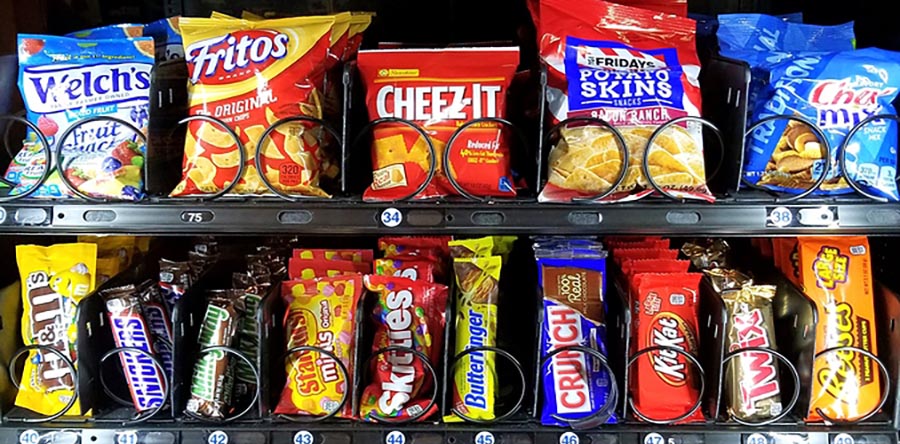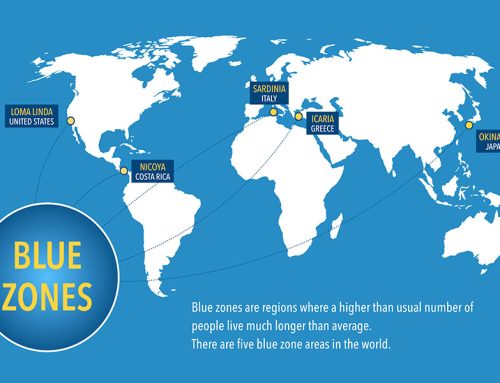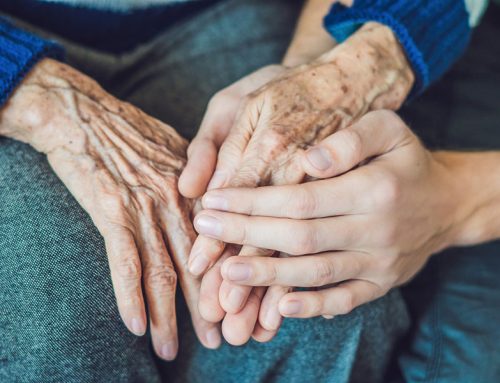In 2019, a study done at the National Institutes of Health (NIH) in Bethesda, Maryland examined the effect that eating ultra-processed food has on body fat. The title of the research paper revealed the outcome in ten words: “Ultra-processed diets cause excess calorie intake and weight gain.”

This created quite a stir on news and social media sites, but most people read the title or a summary and simply said, “Duh! Common sense. Nothing new. Everyone knows that.” While it is generally correct that ultra-processed food increases obesity risk, the truth is not as simple as saying, “If you eat heavily processed food, it always turns into fat.”
What the study found specifically was that ultra-processed foods are hyper-palatable, and also affect your body’s hormonal response to a meal. The group eating highly processed food had higher levels of the hunger hormone ghrelin, while the unprocessed food group showed an increase in the appetite suppressing hormone PYY.
Put together, that means ultra-processed foods encourage you to overeat into a calorie surplus. Yep – the food industry really does engineer products that make it easier to eat more and make it harder to stop. The most shocking discovery in the NIH study was the degree to which hyper-palatable foods encouraged overeating: The subjects ate the processed food 17 calories per minute faster. This confirmed previous research which showed that a 20% change in how fast you eat can impact your calorie intake by 10% to 13%.
Translation: Eat more quickly, eat more calories, gain more fat. Eat more slowly, eat fewer calories, lose more fat. (Eating slowly, by the way, is one of the simplest scientifically proven “hacks” you’ll ever find for easily losing more fat).
Over a month, the group eating highly processed food ate an average of 508 additional calories per day when not tracking calories. That’s a huge difference! Conversely, the group eating less processed food ate fewer calories than normal and lost significant amounts of weight in only one month – again, purely by focusing on eating more unprocessed foods, not counting calories.
Now, again remember that we’re not implying that “processed food just turns into fat.” That’s not a nuanced enough explanation. If you eat processed food, and yet still find a way to stay in a calorie deficit, you won’t gain fat. That’s why most informed and sensible dieters give themselves a 10% or even a 20% allowance for eating anything they want as long as they’re mindful of calories. (They don’t buy into the idea that some foods should be forbidden). This “flexible dieting” approach is more psychologically healthy and certainly more sustainable than trying to be a perfectionist and aiming for 100% adherence to “clean” foods.
While the increased intake of processed food is influenced partly by hormones, it still ultimately boils down to calories in versus calories out.
People are always fighting over whether the ideal weight loss diet is low carb, keto, paleo, high protein, low fat, vegan, and so on. The question is not whether these diets work – all of them can work, and no single diet is suitable for everyone’s preference and lifestyle. The more important question is, “when a diet works, why does it work?” The answer is that all roads lead back to a calorie deficit. Yet for some strange reason, there are still large groups of people who don’t believe weight loss or gain is a calorie thing – they think its a food thing or a macro thing.
Low carb dogma for example, is usually dismissive of the role of calories. Some low carb and keto advocates to this day will tell you that obesity is caused by carbs and insulin. Science does not support the carbohydrate-insulin hypothesis. Ultra-processed carbs can be a big part of the energy surplus that makes the average person fat, but the call to cut carbs is simply one of many ways to cut calories.
Advocates of low fat or vegan diets may claim that dietary fat or a high intake of animal products is responsible for fat gain. Yes, there are observational studies showing high fat diets correlate to weight gain, yet there is no cause and effect link there either. Ultra-processed foods are a delivery vehicle for unhealthy fats, and dietary fats are calorie-dense.
It’s possible to lose weight on a high fat/low carb diet, just as it is on a high carb/low fat diet. The common denominator is a calorie deficit. We could just as easily reject demonizing a whole macronutrient and instead call for a reduction in processed foods of all kinds, whether they are proteins, carbs, or fats.
This NIH study was a short-term experimental trial that focused on the effect food choice had on calorie intake and body fat. It didn’t look at health outcomes, outside of acknowledging that being overweight or obese increases your risk for many lifestyle diseases.
In 2020, a new scientific review out of China was published, which looked at the effects of ultra-processed foods on health and disease. Obesity and overweight were just one of many health outcomes on the list.
No surprise, the study found that ultra-processed foods were positively associated with a long list of health problems and diseases:
-Death (“all-cause mortality”)
-Stroke (cardiocerebrovascular diseases)
-Respiratory diseases (including asthma)
-Gastrointestinal diseases (including IBS)
-Depression (and mental health diseases)
-Metabolic syndrome (encompassing high blood pressure, high cholesterol and blood sugar problems).
-Overweight/obesity
-Some types of cancers
-Frailty in old age (geriatric diseases)
Once again, this type of research may provoke a “Yeah, no kidding processed food is unhealthy” response. But this was the first systematic review of all epidemiological studies that confirmed it in a scientific journal, including listing the specific diseases most likely to afflict you if you over-indulge in ultra-processed food.
These results validate what almost everyone already believed: There’s been a huge increase in the availability and number of ultra-processed foods in recent decades, the incidence of non-communicable diseases has gone up in conjunction with it, and it’s not due to coincidence or random chance. Ultra-processed foods are largely responsible for the increase. Also, most noncommunicable diseases can be prevented by changes in diet patterns.
In this recent health-focused study, processed foods were stratified to acknowledge that all processed foods don’t fit into one category, each equally negative in effects. Some foods are only slightly processed. Others are moderately or highly processed. Sadly, more and more today, many fall into the new fourth category – ultra-processed.
If you want to be nit-picky, you could say that my morning Quaker oats are processed. But the only processing is steaming and rolling them and putting them in a container. The only ingredient is oats. This is a minimally processed food – virtually unprocessed, really. Add refined sugars and flavorings, and then it moves up the processing ladder. Put a few oats in a candy bar, loaded with sugar, industrial fats, salt, and additives, and then you have a highly processed food. Processing is not an either-or matter, it runs in degrees. Ultra-processed is the extreme worst end of the spectrum.
Ultra-processed food characteristics were defined as:
-Formulations of ingredients derived from foods and additives, coupled with substances including colorings flavorings, sweeteners and emulsifiers.
-They contain little, if any intact food.
-They included sugar-sweetened beverages, sweets, ice cream, chocolates, savory snacks, processed meat, and frozen packaged dishes.
-They are durable, ready to consume, and low-cost.
-They are hyper-palatable.
-They are packaged and heavily marketed.
-They are typically fatty, sugary and salty.
-They lack protein, fiber, micronutrients and bioactive compounds.
This new study did not go into detail about how much ultra-processed food consumption it would take to increase these health risks. However, it did confirm that for the average person living in a high-income, industrialized country, a population in which all these diseases are rampant, at least half or even more of all the foods eaten are ultra-processed.
No specific recommendation was given about how much processed food is safe. We don’t know that for sure yet. We may never know. What are they going to do, commission a study where some groups eat various large amounts of cookies, ice cream, cake, chips, candy, doughnuts and pop tarts for months or years and wait to see what diseases they get? I know some people that would volunteer for that, but I don’t think it would get past an ethics committee.
Two things the researchers did say were:
1. The greater the share of ultra-processed foods in the diet, the higher your risk of these diseases.
2. We need to focus on eating more unprocessed food and less processed food.
They didn’t suggest eating zero processed food. Neither do the best health and fitness coaches today. More often, a good evidence-based coach will recommend aiming to get 80% to 90% of your total daily or weekly calories from nutrient-dense, unprocessed foods.
If nutritious, unprocessed foods make up the majority of your calories, it’s not necessary to eliminate processed foods completely to be lean and healthy. In fact, the reverse is true – most people who try to abstain completely, or label foods as good or bad (with only a handful of personality types being exceptions), are at higher risk of binging, eating disorders, and diet failure. It’s what you eat most of the time, not once in a while that matters.
A confounder that would be worth teasing out in future studies is the effect weight loss has on health markers in people eating a larger percentage of their total calories from highly processed foods. Both science and anecdote have shown that certain health markers improve with weight loss even if the diet quality is far from perfect. Losing excess body fat is good for you. Even the nutrition professor who did the famed “Twinkie diet” improved some of his health markers (at least in the short term) because he controlled his calories and lost weight during his experiment where he was eating mostly junky food.
The bottom line is that anyone who eats the majority of their calories from processed food is at great risk for a lot of health problems in addition to fat gain. And if you eat half or even more of your calories from ultra processed food and you’ve already been gaining weight, you are at serious risk of getting seriously sick or even dying if you don’t turn it around and change your habits.
– Tom Venuto, author of Burn the Fat, Feed the Muscle
Scientific References:
Chen, X et al, Consumption of ultra-processed foods and health outcomes: a systematic review of epidemiological studies, Nutrition Journal, 20;19(1):86, 2020.
Hall K, Ultra processed diets cause excess calorie intake and weight gain: A one-month inpatient randomized controlled trial of ad libitum food intake, NutriXiv, 2019.
Related: Processed Food, Fat Loss And Health

Tom Venuto is a natural bodybuilding and fat loss coach. He is also a recipe creator specializing in fat-burning, muscle-building cooking. Tom is a former competitive bodybuilder and is today a full-time fitness writer, blogger, and author. His book, Burn The Fat, Feed The Muscle is an international bestseller, first as an ebook and now as a hardcover and audiobook. The Body Fat Solution, Tom’s book about emotional eating and long-term weight maintenance, was an Oprah Magazine and Men’s Fitness Magazine pick. Tom is also the founder of Burn The Fat Inner Circle – a fitness support community with over 52,000 members worldwide since 2006. Click here for membership details







Hi Tom,
In this article you mention several times about reducing caloric intake to lose weight, however, years ago before diets were being named, I saw a nutritionist that put me on a 2000 cal diet with a booklet that told me how many servings I had to eat from each section. I was 5’ 6” and weighed 270 lbs. I was a stay at home mom and didn’t exercise. It was hard at first trying to eat that many calories and get in the servings of each section. It was more than I was used to eating and the fat just melted off. I got down to 160 lbs. Another time just a few years ago I again was overweight and started loosing weight like crazy. Then when I thought about it the only thing that had changed was I had quit using sweeteners. I would like to see your comment on these. Thank you for all your knowledgeable blogs and books!
Becky P
So we can consider whey protein (as well as other fitness sups) as ultra processed food?
Processed yes, but I wouldn’t call whey ultra-processed – it doesn’t fit the definition the scientists have created for ultra processed (there are specific criteria listed for that). Plus whey is a healthy “food” that many people call a functional food due to unique benefits and nutritional value. I actually take no supplements but I use whey both for convenience and as a recipe ingredient.I see it more like “powdered food.” I never considered it processed in a negative kind of way.
I feel like industrial and non industrial seed oils alike(veg., palm, canola, etc)) never get demonized for their roll in ‘ultra-processed’ foods. Is there a reason for that? Looking at the rise in heart disease, obesity, among others starting around 1860 when seed oils were first introduced, you can see a clear correlation between the rise of heart disease, obesity, with the rise of ultra-refined seed oils in our daily diet.
Yes, I think that’s a great point. Thanks for bringing that up. Like almost all other food categories, oils & fats are healthiest when consumed in moderation, in their completely unprocessed, intact state – whole olives vs. olive oil, whole almonds vs. almond oil, whole soybeans (edamame) vs soy oil, etc. Those processed & ultraprocessed oils are used widely in processed and restaurant foods, and are quite dangerous.